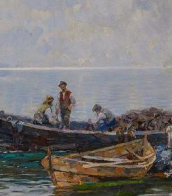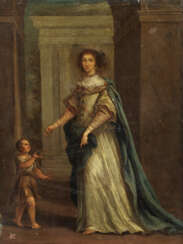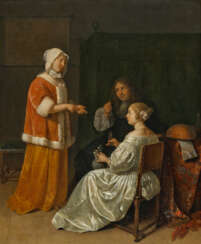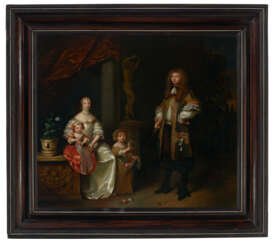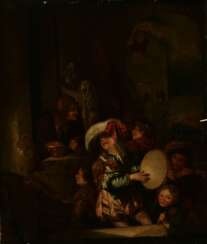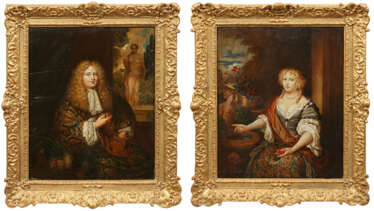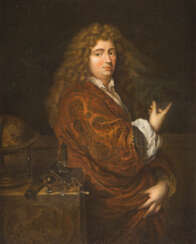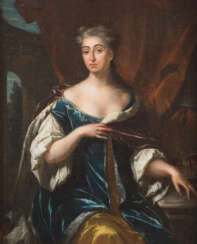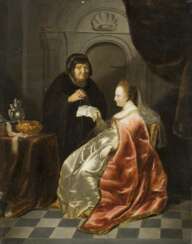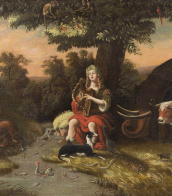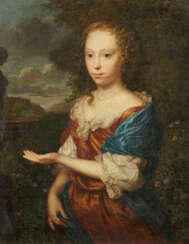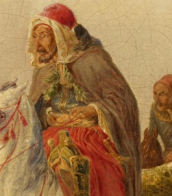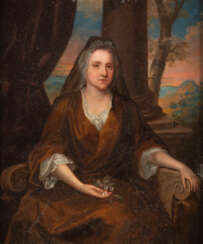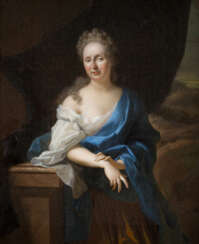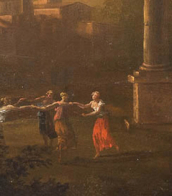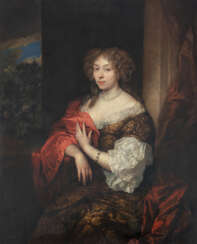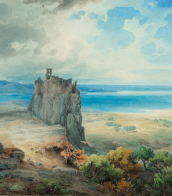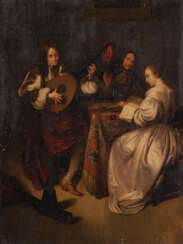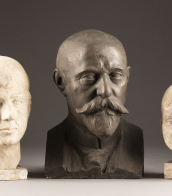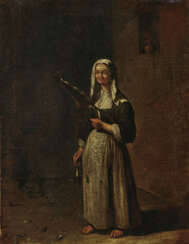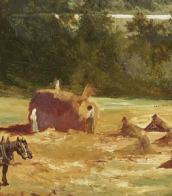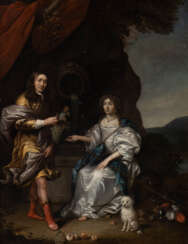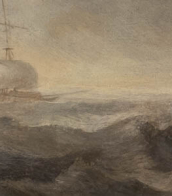caspar netscher (1639 - 1684)
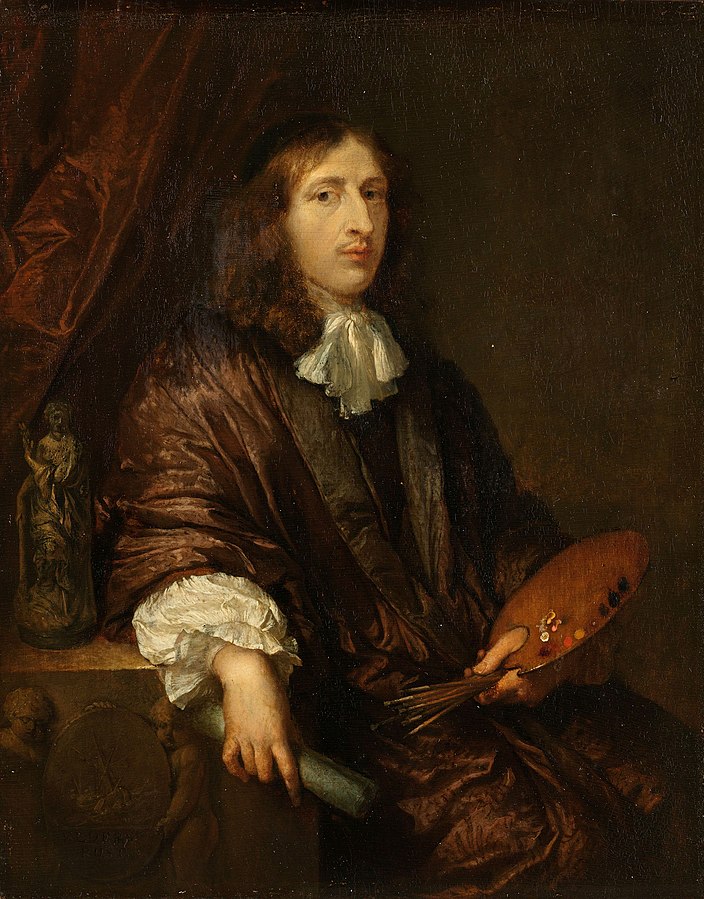
Caspar Netscher was a Dutch painter of the Golden Age of Dutch painting, known for his portraits. Netscher chose subjects from the life of the Dutch elegant and wealthy class; he painted many small portraits - mostly of women; some of them historical. After spending some time in Paris, he painted several persons belonging to the court of Louis XIV. In addition to the above-mentioned usual subjects, he depicted sometimes historical and biblical scenes.
Caspar Netscher's paintings were kept in many art galleries: in the Louvre, Amsterdam, Florence, in several private collections in England and in many other places. In the Hermitage at the beginning of the 20th century there were six of his paintings, including a portrait of the artist himself and a portrait of Mary Stuart, painted in 1683; today only two works have survived.
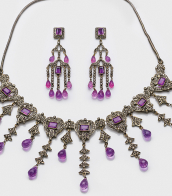

Caspar Netscher was a Dutch painter of the Golden Age of Dutch painting, known for his portraits. Netscher chose subjects from the life of the Dutch elegant and wealthy class; he painted many small portraits - mostly of women; some of them historical. After spending some time in Paris, he painted several persons belonging to the court of Louis XIV. In addition to the above-mentioned usual subjects, he depicted sometimes historical and biblical scenes.
Caspar Netscher's paintings were kept in many art galleries: in the Louvre, Amsterdam, Florence, in several private collections in England and in many other places. In the Hermitage at the beginning of the 20th century there were six of his paintings, including a portrait of the artist himself and a portrait of Mary Stuart, painted in 1683; today only two works have survived.
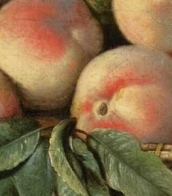

Caspar Netscher was a Dutch painter of the Golden Age of Dutch painting, known for his portraits. Netscher chose subjects from the life of the Dutch elegant and wealthy class; he painted many small portraits - mostly of women; some of them historical. After spending some time in Paris, he painted several persons belonging to the court of Louis XIV. In addition to the above-mentioned usual subjects, he depicted sometimes historical and biblical scenes.
Caspar Netscher's paintings were kept in many art galleries: in the Louvre, Amsterdam, Florence, in several private collections in England and in many other places. In the Hermitage at the beginning of the 20th century there were six of his paintings, including a portrait of the artist himself and a portrait of Mary Stuart, painted in 1683; today only two works have survived.
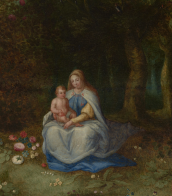

Caspar Netscher was a Dutch painter of the Golden Age of Dutch painting, known for his portraits. Netscher chose subjects from the life of the Dutch elegant and wealthy class; he painted many small portraits - mostly of women; some of them historical. After spending some time in Paris, he painted several persons belonging to the court of Louis XIV. In addition to the above-mentioned usual subjects, he depicted sometimes historical and biblical scenes.
Caspar Netscher's paintings were kept in many art galleries: in the Louvre, Amsterdam, Florence, in several private collections in England and in many other places. In the Hermitage at the beginning of the 20th century there were six of his paintings, including a portrait of the artist himself and a portrait of Mary Stuart, painted in 1683; today only two works have survived.
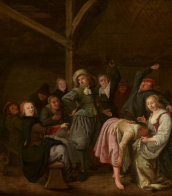

Caspar Netscher was a Dutch painter of the Golden Age of Dutch painting, known for his portraits. Netscher chose subjects from the life of the Dutch elegant and wealthy class; he painted many small portraits - mostly of women; some of them historical. After spending some time in Paris, he painted several persons belonging to the court of Louis XIV. In addition to the above-mentioned usual subjects, he depicted sometimes historical and biblical scenes.
Caspar Netscher's paintings were kept in many art galleries: in the Louvre, Amsterdam, Florence, in several private collections in England and in many other places. In the Hermitage at the beginning of the 20th century there were six of his paintings, including a portrait of the artist himself and a portrait of Mary Stuart, painted in 1683; today only two works have survived.


Caspar Netscher was a Dutch painter of the Golden Age of Dutch painting, known for his portraits. Netscher chose subjects from the life of the Dutch elegant and wealthy class; he painted many small portraits - mostly of women; some of them historical. After spending some time in Paris, he painted several persons belonging to the court of Louis XIV. In addition to the above-mentioned usual subjects, he depicted sometimes historical and biblical scenes.
Caspar Netscher's paintings were kept in many art galleries: in the Louvre, Amsterdam, Florence, in several private collections in England and in many other places. In the Hermitage at the beginning of the 20th century there were six of his paintings, including a portrait of the artist himself and a portrait of Mary Stuart, painted in 1683; today only two works have survived.

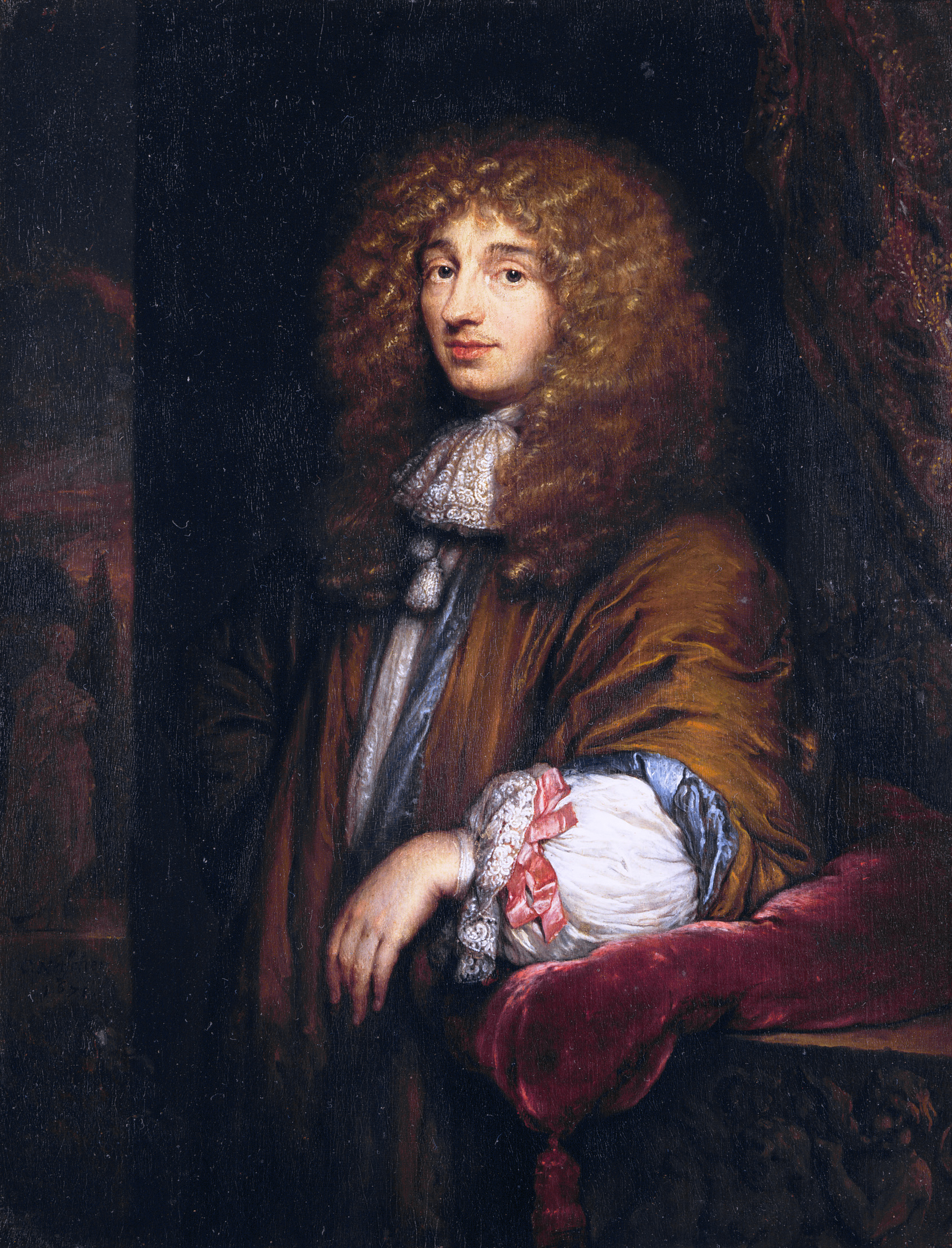
Christiaan Huygens van Zeelhem was a Dutch mechanic, physicist, mathematician, inventor and astronomer who formulated the wave theory of light.
An admirer of Descartes, Huygens preferred to conduct new experiments himself to observe and formulate laws. In physics, he contributed to the development of the crucial Huygens-Fresnel principle, which applies to wave propagation. He also extensively investigated free fall. He experimentally proved the law of conservation of momentum. He derived the law of centrifugal force for uniform circular motion.
He also invented the pendulum clock, discovered centrifugal force and the true shape of Saturn's rings as well as its moon Titan. Huygens is considered the first theoretical physicist to use formulas in physics and one of the founders of theoretical mechanics and probability theory.

Caspar Netscher was a Dutch painter of the Golden Age of Dutch painting, known for his portraits. Netscher chose subjects from the life of the Dutch elegant and wealthy class; he painted many small portraits - mostly of women; some of them historical. After spending some time in Paris, he painted several persons belonging to the court of Louis XIV. In addition to the above-mentioned usual subjects, he depicted sometimes historical and biblical scenes.
Caspar Netscher's paintings were kept in many art galleries: in the Louvre, Amsterdam, Florence, in several private collections in England and in many other places. In the Hermitage at the beginning of the 20th century there were six of his paintings, including a portrait of the artist himself and a portrait of Mary Stuart, painted in 1683; today only two works have survived.
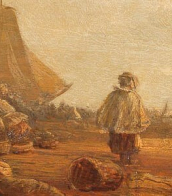

Caspar Netscher was a Dutch painter of the Golden Age of Dutch painting, known for his portraits. Netscher chose subjects from the life of the Dutch elegant and wealthy class; he painted many small portraits - mostly of women; some of them historical. After spending some time in Paris, he painted several persons belonging to the court of Louis XIV. In addition to the above-mentioned usual subjects, he depicted sometimes historical and biblical scenes.
Caspar Netscher's paintings were kept in many art galleries: in the Louvre, Amsterdam, Florence, in several private collections in England and in many other places. In the Hermitage at the beginning of the 20th century there were six of his paintings, including a portrait of the artist himself and a portrait of Mary Stuart, painted in 1683; today only two works have survived.

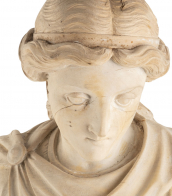

Caspar Netscher was a Dutch painter of the Golden Age of Dutch painting, known for his portraits. Netscher chose subjects from the life of the Dutch elegant and wealthy class; he painted many small portraits - mostly of women; some of them historical. After spending some time in Paris, he painted several persons belonging to the court of Louis XIV. In addition to the above-mentioned usual subjects, he depicted sometimes historical and biblical scenes.
Caspar Netscher's paintings were kept in many art galleries: in the Louvre, Amsterdam, Florence, in several private collections in England and in many other places. In the Hermitage at the beginning of the 20th century there were six of his paintings, including a portrait of the artist himself and a portrait of Mary Stuart, painted in 1683; today only two works have survived.
